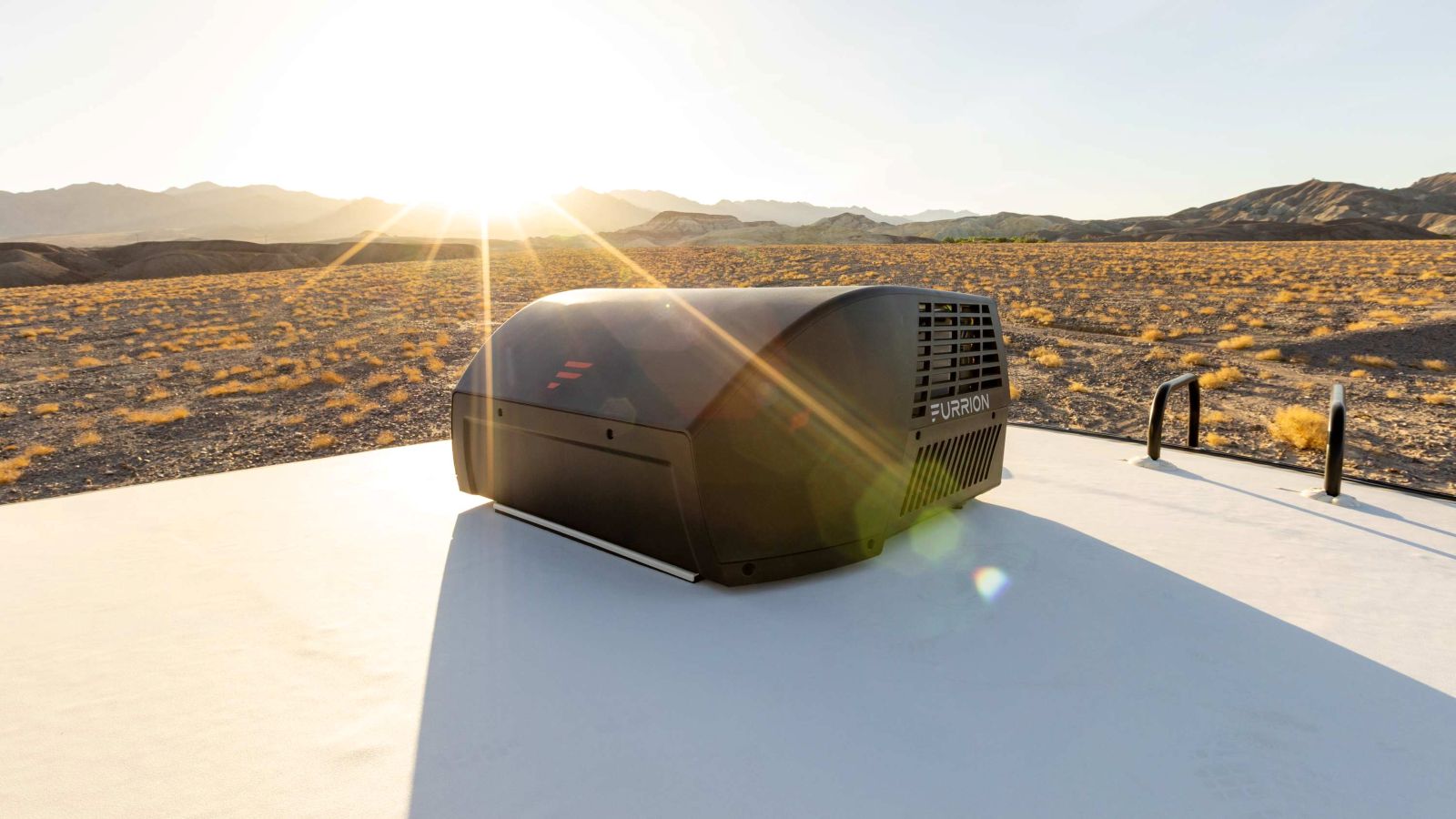When you’re traveling in an RV, few things are more essential to your comfort than a reliable air conditioner. Whether you're navigating a hot desert or simply parked at a sunny campground, your RV air conditioning system plays a vital role in keeping your living space cool and livable.
But with so many options, power considerations, and maintenance factors involved, it's no surprise that RV owners have plenty of questions. To help you get the most out of your cooling system, we’ve compiled a list of the most frequently asked questions about RV air conditioners along with clear, expert answers from the team at Furrion.
1. What Types of RV Air Conditioners Are There?
RV air conditioners come in several styles, each with unique benefits depending on your rig and travel style. Some of the most common types include:
Rooftop AC Units
These are the most common and are mounted on the roof of your RV. They typically offer powerful cooling and save interior space, especially with low-profile models.
Under-bench or Basement AC Units
Installed underneath the RV floor, these units are quieter and hidden from view, though they can be more complex to service.
Portable RV ACs
Portable ACs are smaller, often plug-in units that can provide spot cooling in a pinch. These are less powerful and not ideal for full-RV cooling.
12V RV Air Conditioners
Designed for energy efficiency and compatibility with off-grid power sources, these models are becoming popular among boondockers and overlanders.
Furrion offers a range of rooftop models, including energy-efficient and quiet AC units that are built to withstand the rigors of road travel.
2. How Do I Know Which RV Air Conditioner Is Right for My RV?
The right air conditioner for your RV depends on a combination of factors, starting with the size of your vehicle. Cooling capacity is measured in BTUs, and in general, the larger your RV, the higher the BTU rating you'll need. Smaller travel trailers and vans may only need a 9,000 to 13,500-BTU unit, while larger 5th wheels and motorhomes often require 15,000 BTUs or more. Some RVers with larger rigs even install a second AC unit to keep up with demand.
You’ll also want to consider the quality of your RV’s insulation and the typical climate where you camp. A well-insulated RV in a temperate area will need less cooling power than a poorly insulated one in hot, humid environments. Power availability is another key consideration. If you rely on solar power, a generator, or an inverter, an energy-efficient model becomes even more important.
Furrion Chill® units are engineered with these variables in mind and are available in a variety of sizes to suit different rigs, power sources, and travel styles.
Learn more about how to choose the best AC
3. How Much Power Does an RV Air Conditioner Use?
Power usage varies depending on the size and model of the AC unit, but a standard 15,000-BTU RV air conditioner will typically require between 1,500 and 2,000 watts to start and around 1,200 to 1,500 watts to keep running. If your RV’s power setup can’t handle that load or if you’re running other major appliances at the same time, you might trip breakers or cause voltage issues.
Understanding your total power usage is essential, especially when you’re off-grid or using a limited campground hookup. Using an energy-efficient RV air conditioner can help reduce the load on your system while still delivering consistent performance. The Furrion Chill® Cube is built to deliver powerful cooling with lower energy consumption, making it a smart choice for energy-conscious travelers.
4. How Can I Make My RV Air Conditioner Run More Efficiently?
To get the best performance from your RV AC, routine maintenance, cleaning, and smart usage are key. One of the easiest ways to boost efficiency is by keeping the air filter clean. Dirty filters restrict airflow, forcing the system to work harder than necessary. It also helps to reduce heat gain inside your RV by keeping windows covered during the day, especially with reflective shades or thermal curtains.
Setting the thermostat to a reasonable temperature will also keep the AC from cycling too frequently. If your unit is constantly turning on and off, it's likely using more power than necessary. Adding portable fans to your RV can help distribute cool air more evenly, reducing the strain on your air conditioner. Lastly, sealing any drafts or gaps around doors and windows prevents warm air from leaking in and cool air from escaping.
5. Why Is My RV Air Conditioner Not Cooling Properly?
When your RV air conditioner isn’t cooling as expected, there are several possible causes. One of the most common is a clogged or dirty air filter, which can significantly reduce airflow. Another issue could be frozen evaporator coils, usually caused by restricted airflow or low refrigerant levels. Blocked or closed vents can also disrupt airflow and cooling efficiency.
Sometimes the problem lies with the thermostat. If it's malfunctioning or not calibrated correctly, the unit might not know when to cool. Voltage issues or inadequate power supply can also cause the system to underperform. If your AC is blowing warm air, smells musty, or isn’t maintaining the set temperature, a thorough inspection and basic troubleshooting may be all you need. But if problems persist, it might be time to call in a technician.
6. How Often Should I Maintain My RV Air Conditioner?
Maintaining your RV AC regularly will extend its life and ensure consistent performance. During the travel season, it’s a good idea to clean or replace your filters once a month. If you travel in dusty environments or frequently run your unit, you may need to do this even more often.
Each season, take time to inspect the evaporator and condenser coils for dust and debris, which can accumulate and block airflow. Once a year, check the seals around your rooftop AC unit to make sure there are no leaks. It’s also worth inspecting for signs of refrigerant leaks or electrical issues. If you store your RV during the off-season, cover your air conditioner to protect it from the elements and keep debris out of the unit.
Furrion’s Chill® AC units are designed with long-term reliability in mind, using corrosion-resistant materials, and tested against road vibrations to hold up season after season.
7. Can I Install or Replace an RV Air Conditioner Myself?
Many RV owners choose to install or replace their AC units on their own, especially if they’re comfortable working with electrical connections and rooftop access. That said, proper installation is essential for safety and performance. You'll need to ensure the new unit is compatible with your RV’s ducting and electrical systems. Always disconnect power before starting any installation project, and use the appropriate sealants to prevent leaks.
Furrion provides detailed installation manuals and support materials to help guide the process. Still, if you're not confident in your abilities or if your RV requires a more complex installation, working with a professional may be the best option.

8. What Makes the Furrion Chill® RV Air Conditioners a Smart Choice?
The Furrion Chill® line is engineered specifically for RVers who demand performance, efficiency, and durability. These units use a dual-fan system to improve airflow and cool your RV faster, even in extreme temperatures. The Chill Cube in particular operates more quietly and efficiently than many standard models, making it ideal for light sleepers or travelers in compact RVs.
Each unit is built with VibrationSmart™ technology to withstand bumps and movement on the road, and ClimateSmart™ features ensure reliable performance across a wide range of temperatures and conditions. For RVers who prioritize energy efficiency, Furrion Chill® models offer smart power usage, quiet operation, and more without compromising cooling output.
Whether you need a powerful ducted unit for a large motorhome or a quieter, non-ducted option for a smaller camper, Furrion has a solution designed to meet your needs.
Learn more about ducted vs. non-ducted options
9. Are There Quiet RV Air Conditioner Options?
Yes, quiet operation is a top priority for many RVers, and today’s AC models are quieter than ever before. Older air conditioners can produce significant noise, especially when the compressor starts up. In contrast, newer systems, like the quiet Furrion Chill® Cube, are built with a variable-speed compressor that minimizes disruption, allowing you to relax, sleep, or enjoy conversation without the constant hum in the background.
For those who travel with young kids, pets, or simply value peace and quiet, upgrading to a low-noise RV AC can make a significant difference.
10. What Should I Do If My RV AC Smells Musty or Blows Warm Air?
A musty smell coming from your RV air conditioner is often caused by mold or mildew buildup inside the unit. Moisture can accumulate in the drip pan or within the coils, especially if the unit isn’t allowed to dry out between uses. Over time, this damp environment can lead to odors that spread throughout your RV every time the AC runs.
If your system is blowing warm air instead of cool, the issue could stem from a number of sources. Dirty filters, clogged coils, low refrigerant levels, or a failing compressor can all reduce cooling performance. Before scheduling a service appointment, it’s worth performing a few basic checks:
-
Clean or replace the air filter. A dirty filter restricts airflow and can lead to both odors and cooling issues.
-
Inspect and clean the evaporator and condenser coils. Built-up dust and debris can prevent efficient heat exchange.
-
Check the thermostat settings. Make sure the unit is set to cool and that the temperature is lower than the current ambient air.
-
Clear the drain pan and check for clogs. Standing water in the system can cause mold and mildew growth.
-
Listen for unusual noises. A loud compressor or rattling fan may point to mechanical issues that require professional attention.
If these steps don’t resolve the issue or if the system continues to blow warm air despite regular maintenance, it may be time to consult a qualified RV technician. Keeping your AC unit clean and dry between uses is the best way to prevent future problems.
Find Your RV AC Unit Today with Furrion
Understanding how your RV air conditioner works and how to maintain and troubleshoot it can help you stay cool and comfortable wherever the road takes you. Whether you're upgrading your system, solving a cooling issue, or simply learning the basics, a little knowledge goes a long way.
Furrion is committed to designing RV air conditioning systems that are durable, efficient, and easy to use. Explore our line of Furrion Chill® AC units to find a model that fits your RV, your travel habits, and your lifestyle.
Need guidance on which system is right for you? Contact our support team or check out our complete guide to choosing the right RV AC for your rig.




Low-Profile RV Air Conditioners: A Smart Upgrade for Modern RVers
How to Choose the Best RV Backup Camera